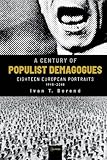A Century of Populist Demagogues : Eighteen European Portraits, 1918–2018 / Ivan T. Berend.
Material type: TextPublisher: Budapest ; New York : Central European University Press, [2022]Copyright date: ©2020Description: 1 online resource (347 p.)Content type:
TextPublisher: Budapest ; New York : Central European University Press, [2022]Copyright date: ©2020Description: 1 online resource (347 p.)Content type: - 9789633863343
- 940.5092/2 23
- online - DeGruyter
| Item type | Current library | Call number | URL | Status | Notes | Barcode | |
|---|---|---|---|---|---|---|---|
 eBook
eBook
|
Biblioteca "Angelicum" Pont. Univ. S.Tommaso d'Aquino Nuvola online | online - DeGruyter (Browse shelf(Opens below)) | Online access | Not for loan (Accesso limitato) | Accesso per gli utenti autorizzati / Access for authorized users | (dgr)9789633863343 |
Frontmatter -- Table of Contents -- Preface and acknowledgement -- INTRODUCTION Who are the populist demagogues, and how can they attain political power? -- PART 1 Interwar populist —communist and fascist— demagogues -- CHAPTER 1 A Hungarian communist demagogue: Béla Kun -- CHAPTER 2 A Hungarian fascist demagogue: Gyula Gömbös -- CHAPTER 3 A Romanian fascist demagogue: Corneliu Zelea Codreanu -- CHAPTER 4 A fascistoid Austrian demagogue: Ernst Rüdiger Starhemberg -- PART 2 Turn of the millennium populist demagogues -- CHAPTER 5 An Austrian far-right demagogue, Jörg Haider -- CHAPTER 6 A Romanian communist demagogue: Nicolae Ceauşescu -- CHAPTER 7 Two contemporary French demagogues: Le Diable and La Fille du Diable,1 Jean-Marie and Marine Le Pen -- CHAPTER 8 An entertaining but harmful buffoontype demagogue: Italy’s Silvio Berlusconi -- CHAPTER 9 Three nationalist demagogues in Yugoslavia and a devastating civil war -- CHAPTER 10 Two British Brexit fighters: Boris Johnson and Nigel Farage -- CHAPTER 11 A “freedom fighter” against the EU: the Dutch Geert Wilders -- CHAPTER 12 Three demagogues exploit the difficult transformation: Viktor Orbán in Hungary and the Kaczyński brothers in Poland -- Conclusion -- Bibliography -- Index
restricted access online access with authorization star
http://purl.org/coar/access_right/c_16ec
The renowned historian Ivan T. Berend discusses populist demagoguery through the presentation of eighteen politicians from twelve European countries spanning World War I to the present. Berend defines demagoguery, reflects on its connections with populism, and examines the common features and differences in the demagogues’ programs and language. Mussolini and Hitler, the “model demagogues,” are only briefly discussed, as is the election of Donald Trump in the United States and its impact on Europe. The eighteen detailed portraits include two communists, two fascists, and several right-wing and anti-EU politicians, extending across the full range of demagoguery. The author covers Béla Kun, the leader of the Hungarian Soviet Republic in 1919, weaving through Codreanu and Gömbös from the 1930s, on to Stahremberg and Haider in Austria, and then more broadly throughout Europe from Ceaușescu, Milošević, Tuđjman, Izetbegović, Berlusconi, Wilders, to the two Le Pens, Farage, and Boris Johnson, Orbán and the two Kaczyńskis. Each case includes an analysis of the time and place and is illustrated with "ations from the demagogues’ speeches. This book is a warning about the continuing threat of populist demagogues both for their subjects and for history itself. Berend insists on the crucial importance for Europe to understand the reality behind their promises and persuasive language as imperative to impeding their success.
Mode of access: Internet via World Wide Web.
In English.
Description based on online resource; title from PDF title page (publisher's Web site, viewed 29. Jul 2022)


